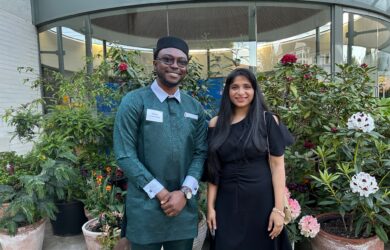Gates Cambridge alumnus Wale Adebanwi is author of the first scholarly book on one of Africa’s most powerful and progressive elites, the Yoruba.
A Gates Cambridge alumnus is to publish the first scholarly book on one of Africa’s most powerful and progressive elites, the Yoruba.
Wale Adebanwi [2003], who did a PhD in Social Anthropology at the University of Cambridge supported by a Gates Cambridge Scholarship, is author of Yoruba elites and ethnic politics in Nigeria: Obafemi Awolowo and corporate agency*, which will be published in April by Cambridge University Press.
The book, which is based on his PhD thesis, investigates the dynamics and challenges of ethnicity and elite politics in Nigeria, Africa’s largest democracy. Wale Adebanwi, who is currently an associate professor in the African American and African Studies Programme of the University of California-Davis, USA, says the book demonstrates how the corporate agency of the elite transformed the modern history and politics of one of Africa’s largest ethnic groups, the Yoruba.
The book is organised around the ideas and cultural representations of Obafemi Awolowo, who is seen as the central signifier of modern Yoruban culture. Through analysis of issues such as political party and ethnic group organisation, cultural politics, democratic struggle, personal ambitions, group solidarity, death, memory and commemoration, the book examines the foundations of the legitimacy of the Yoruba political elite.
Using historical sociology and ethnographic research, Adebanwi traces the internal and external struggles for power of what is considered one of the most powerful and progressive elite groups in Africa. The book is described as the first authoritative scholarly book on the Yoruba.
His publisher states: “It combines both the perspectives and disciplinary methods of anthropology, historical sociology and political science in examining how Obafemi Awolowo and the groups and political parties he created and those that were created in his name after his death re-made Yorùbá history in modern times.”
*Cambridge University Press, New York, 2014, pp. 320. ISBN: 9781107054226












